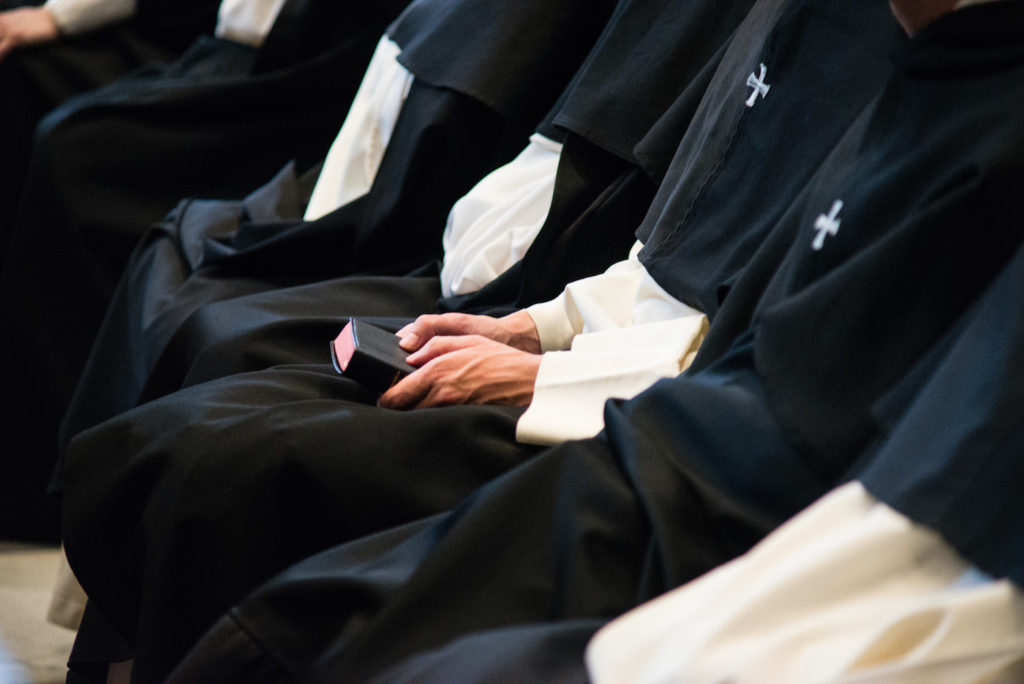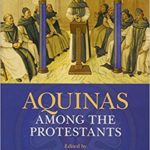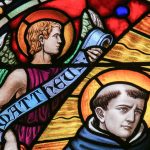The following is excerpted from a longer interview with Fr. Thomas Joseph White, OP. It appears as one of sixteen interviews with converts in Mind, Heart, and Soul: Intellectuals and the Path to Rome, edited by Robert P. George and R. J. Snell, which was released today.
Hope Kean: What is your current role in the Catholic Church?
Fr. Thomas Joseph White: I’m a Catholic priest in the Dominican Order and teach theology and philosophy at the Dominican House of Studies. I also direct the Thomistic Institute, which puts on academic conferences at secular university campuses. We try to bring Catholic intellectual content to the venues where it’s not typically accessible. [Editor’s note: Since this interview, Fr. White has taken up a new position at the Pontifical University of St. Thomas Aquinas, the Angelicum, in Rome.]
When you were grappling with philosophical questions before your conversion, what was the biggest sticking point?
Start your day with Public Discourse
Sign up and get our daily essays sent straight to your inbox.I had the standard undergraduate formation of the early 90s, one indebted to Nietzsche and Foucault, but which also turns toward American liberalism. I would call it a kind of politics of identity, strongly affected by Foucault and Rawls. This is what I was effectively educated in, and those ideas continue to be at the heart of our cultural intellectual life. I had a lot of questions about whether the intellect reaches the truth, the metaphysical constitution of reality, and if we have certitude about that. Is there any such thing as natural knowledge of God? What are the principles by which we begin to articulate a universal human morality, or what are the fundamental principles by which we begin to identify the structures of the natural laws in ourselves? Those questions were left largely unresolved.
At Oxford I began to pose question about the intelligibility of reality as it relates to the theological truths of the Faith. While I didn’t have many resources in myself on that set of questions because I was studying theology rather than philosophy, I knew people who did have a synthetic vision and realized there was a tradition that could grapple with these topics. I had read Alasdair MacIntyre, who engages the Thomistic tradition, so I wanted to study Aquinas more formally, although my access to him was through talking to Dominicans. It was only when I entered seminary that I had a formation in Aristotelian and Thomistic thought.
You’ve written how people’s worldviews are shaped by “a diverse but converging set of unified theories which define one’s prior assumptions about what reality is.” Is this true of atheists and religious believers alike? Did you fully grasp two sets, as it were, and then determine what was most compelling?
St. Thomas’s philosophy of nature, metaphysics, understanding of the human person, epistemology, logic, and ethics make sense even independently of divine revelation while being deeply compatible with it. He also articulates an understanding of revelation that assimilates his realistic philosophical approach to the world. Of course, it’s not that you can just read Aquinas and then never have to read anything else or that he provides a system resolving every problem. He does not offer a system but insights into the structure of reality that you can see are true. Simple examples like the distinction between form and matter, for instance, grapple with the fact that a water molecule is different than a kangaroo, which is different from a cactus, which differs from a human, but still each of them have material elements and component parts present that allow us to understand what they are and how they exist. You can’t reduce an explanation of these physical realities to their material component parts or to their essential form. This metaphysical grammar allows you to analyze reality in all physical things. That’s just one example, but there are lots of other ones, too, and they help you understand so much about the world independently of the Catholic faith. But once you understand them and how they relate to the faith you have a very powerful combination. Aquinas is a deeply grounded philosophical realist, a deeply grounded theological realist, and a mystic; it’s a very powerful combination.
You found that harmony compelling in St. Thomas and also in the Thomists you met?
Yes, and as I met more people I realized Thomism is a living culture in the Church. It’s a mistake to think the Church cannot accommodate a multiplicity of different philosophers and theologies. The Church is united doctrinally, sacramentally, and by its moral ethos, and that real unity can accommodate diverse visions of theology within itself without any rupture, so long as diverse theologies are each receptive of the complete doctrinal teaching of the Church. It’s constructive that the members of the Church can argue about philosophy and history, and engage with the study of science and history. Not everybody has to be a Thomist, but it is vital to the Church that there is a Thomistic tradition and culture, which is not only a culture of intellect but also a way of life. Aquinas lived the Dominican life of prayer, study, commentary on Sacred Scripture, Eucharistic devotion, deep loyalty to Christ and the Virgin Mary, and service to his brothers—this was all part of how he lived the intellectual life. Of course, many people are genuine Thomists without being Dominicans, but the deeper point is that Thomism is an intellectual tradition at the heart of the Church in a living relation with God and in service to others, both through teaching of the truth, which Aquinas calls the greatest spiritual work of mercy, but also through acts of prayer and charity. Aquinas has a profound and beautiful analysis of what the life of service consists in. So, yes, over time I discovered the Thomistic tradition of analysis and also a way of life that is wonderful, present in the Dominican Order.
In your book The Light of Christ, you write about “a non-Christian monotheist who confides himself to God in poverty of heart or seeks to live by authentic truths of natural law outside of the Catholic Church”—is this an insight you gained only after living the life of a Catholic inside the Church?
I was writing about the possibility of salvation outside the Church. First of all, the Church teaches unequivocally that salvation occurs only by virtue of the grace of Christ, but my point in that passage is that the grace of Christ can be at work in people who don’t explicitly recognize Christ or the truth of Christianity. I’m not being Pelagian in saying this; like Pius IX in the nineteenth century, I’m recognizing that God’s grace can be at work in persons of good will. As a priest, I work with people becoming Christian as well as Catholic, so I’m privileged to observe the recurrent dynamic patterns that emerge in people who are evidently affected by grace. Often I work with them with respect to their emotional or ethical challenges, but also with respect to their intellectual challenges to certain Catholic dogmas or teachings. It does seem to me that God’s grace is often at work in people who are just seeking to figure out the meaning of life, prior to their decision to be baptized or become Catholic. It’s not at all rare for me, for example, to meet with an atheist, or perhaps a person who’s Jewish or Muslim or a lapsed ex-Protestant or ex-Catholic who’s intellectually drifting but curious and trying to figure things out. You often see signs or indications of the effects of grace—it’s easier to say with confidence that, yes, obviously, grace has been at work here once they move on to seek Baptism or Confirmation.
Which contemporary or modern sentiments or questions do you think Thomas can address?
I may be optimistic, but I think there are many. Thomism helps provide a realistic philosophy of nature, what it means that there are changing substances around us that have identifiable properties by which we can provide taxonomies for the natures of things and understand the ways in which they act upon each other. Aquinas is a phenomenal student of human nature, so he takes very seriously man’s physicality and animality, but also shows his emergent rational properties and freedom in their distinctiveness. He shows there are immaterial features to human knowledge and freedom that denote the presence of an immaterial form or spiritual soul. There’s also the whole architecture of virtue ethics Aquinas provides that is increasingly having an influence in the circles of analytical ethics. His study of the cardinal virtues—justice, prudence, temperance, and fortitude—provides terrific insight into the nature of a person. We’re longing for that in a culture in which there’s a great deal of intellectual instability and nostalgia for consensus. Often people want to impose consensus artificially through politics, which is a very superficial way to gain unity. That politics pervades the university, which is in crisis because there is deep absence of consensus about reality. Aquinas’s general anthropology and moral theory can give us the basis for a much deeper agreement about what human beings are and the structure of moral life than can any identity politics.
Religion doesn’t go away when you banish it from the university. It comes back in other forms, some of which are perfectly innocuous, but others of which are very dangerous. Aquinas is very realistic about the possibilities of pathological religious behavior, he calls it superstitio, the vice of disordered religion. The human being can very easily become irrationally religious, as, for example, in the cases of a banal religious emotivism or religiously motivated terrorism. The great conflicts we have between religionists and secularists, it seems to me, are very helpfully addressed by the harmony of reason and revelation in Aquinas, which allows the soul to flourish because the soul is meant for transcendence. Modern secular culture is asphyxiating. The soul needs to be open to the transcendent mystery of God to really experience the full freedom of its own intellectual life, its own voluntary life, its aspiration to the good, and its deepest desires for transcendence and meaning. A culture without an intellectual religious horizon is a truncated culture, but a culture that’s religious at the expense of the intellectual life is also a very unhealthy culture—so how do you get that right? I think Aquinas really helps us understand our natural religious aspirations in a balanced way.
Do you have further thoughts for those who may be early in their search for the truth?
The great enemy is intellectual despair. It’s extremely important to persevere in seeking the truth with open horizons. We have to avoid being paralyzed by superficial intellectual conventions because convention sometimes stultifies people. Some cultural convention can be a safeguard in preserving what many people know to be true and sane. But in our life of seeking the truth we have to transcend conformism, resist despair, and remain ardent in the search for the truth. The other thing is to find wise teachers. The idea that we can seek the truth all alone is foolish; we need wise teachers and friends, some who are dead and some who are living. A third and in fact related point: I have yet to meet someone who regretted becoming Catholic. I’ve talked to a lot of people who were very nervous about it beforehand, very afraid, wondering if they were making a mistake. But it’s like a doorway you have to step across. You’re going to find peace and fulfillment, and will not regret it, but you have to take that step. The sacraments are an extremely powerful source of grace and in a sense this can only be discovered by experience. They work, ex opere operato, from the very work of the rite. When you begin to receive the sacraments regularly, you receive inward peace and resolution. When I was becoming Catholic, a Benedictine monk told me to go regularly to Confession, every week or two, and to go to Mass often, every day if possible, and said that this would be the most helpful thing to do. I thought that sounded a little mechanical, but he knew the truth of the matter, which is that God works through the sacraments, so if you approach them with goodwill they will change you over time.
It’s not really that complicated. If you engage with God on God’s terms according to the Church’s teachings, God will sanctify you, and you will achieve real friendship with God. That doesn’t mean you won’t suffer, but your suffering will take place in Christ, and that’s deeply meaningful and consoling. The real answer is to enter the Catholic Church and live the sacramental life, and not despair in the search for the truth, because God is always very close to us and will give us the means to arrive at the destination if we want Him to do so.














